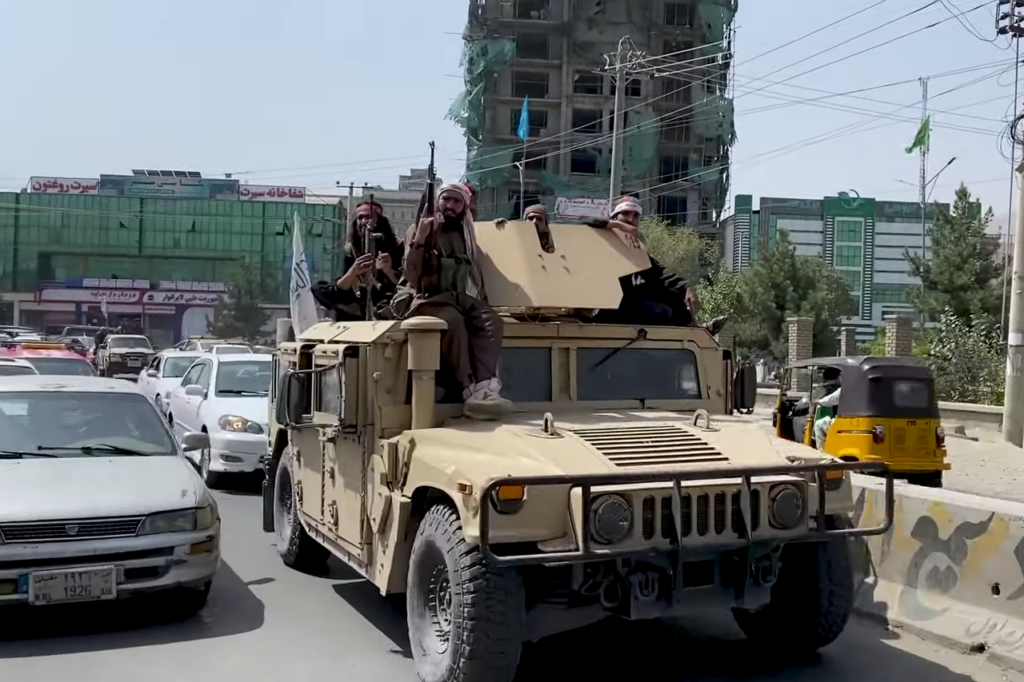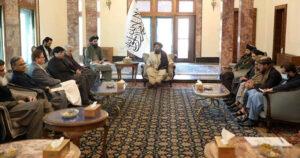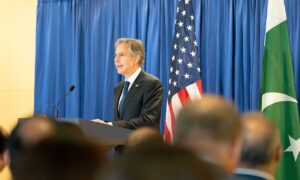The US has pursued an on-again-off-again engagement strategy with the Taliban in an effort to secure U.S. interests since the group’s return to power in August 2021. This outreach has found some, albeit limited, purchase on issues such as the release of captive Americans, the resettlement of Afghan partners, and the facilitation of aid delivery. Where engagement has been less effective is in addressing the Taliban’s increasingly draconian restrictions on the rights of women and girls and lack of inclusivity. These issues remain serious impediments blocking the relaxation of sanctions and movement toward recognition. Despite these challenges, Washington has determined that it is better able to both secure US objectives and support the people of Afghanistan through a moderated engagement strategy than by doubling down on existing coercive measures.
Shifting dynamics could test this approach. First, while Afghanistan has been notably insulated from geopolitical competition, China’s moves towards de-facto recognition could put pressure on the existing international consensus against recognizing the group. Second, waning foreign humanitarian assistance from donors amid multiple crises, combined with continued concerns over sanctioned individuals controlling funds, could complicate efforts to realize a more sustainable economic model. Finally, the upcoming US presidential election this November raises questions about the longevity of engagement efforts and shifts in approach under a potential Trump administration.
In the context of these challenges, the independent assessment prepared for the United Nations last November represents a useful way forward for better-coordinated and consistent international engagement in Afghanistan. This includes a roadmap for Afghanistan’s reintegration into the international community contingent on actions taken by the Taliban. It also includes the appointment of a Special Envoy to lead international engagement with the group. Despite concerns from the Taliban and their refusal to attend recent UN-led talks in Doha, the independent assessment’s recommendations are practical steps worthy of a continued diplomatic push at a time when Washington’s options are limited and the window for outreach may be narrowing.1 United Nations, S/2023/856 The Independent Assessment on Afghanistan and the U.N. Secretary General’s Letter of November 8, 2023, New York, United Nations Security Council, 2023, https://unama.unmissions.org/sites/default/files/2023_11_sg_special_assessment_report.pdf
Two Years In, On Again, Off Again
Following the Taliban’s sweep into Kabul, both the US and the Taliban were thrown into a period of intense tactical coordination regarding evacuation flights and airport security. Aligned imperatives facilitated this engagement: the US needed to evacuate its citizens and Afghan allies, and the Taliban sought to ensure a full US drawdown. The result was a unique opening for limited cooperation between the two sides that would otherwise have been all but impossible, given their mutual animosity and the political scrutiny on the Biden administration following the takeover.
As the dust settled through the fall and winter of 2021, the US pursued a policy of tentative engagement. Taliban representatives in Doha tried to assure the international community that they had changed following their draconian rule in the 1990s. Washington adopted a pragmatic approach that combined the provision of humanitarian assistance with steps to prevent the collapse of Afghanistan’s economy. Key among these were the general licences issued by the Treasury Department, which sought to facilitate some transactions with Afghanistan despite existing sanctions. Simultaneously, Washington engaged in quiet outreach to Taliban representatives on issues including counterterrorism, inclusivity, and the rights of women and girls. The US resisted calls from the Taliban for diplomatic recognition, sanctions relief, and the unfreezing of Afghan central bank assets, which Washington had undertaken following the Taliban takeover.
The Taliban’s March 2022 decision to prevent the reopening of girls’ secondary schools was the first of several events that temporarily derailed high-level engagement.2 Heather Barr, “Taliban Close Girls’ Secondary Schools in Afghanistan, Again,” Human Rights Watch, March 23, 2022, https://www.hrw.org/news/2022/03/23/taliban-close-girls-secondary-schools-afghanistan-again. This move, alarming in its own right, also contradicted assurances from the group’s Doha representatives and dashed hopes of progress towards a key policy goal, raising challenging questions over future engagement. Without access to Taliban leader Hibatullah Akhundzada and his small group of Kandahar-based advisors, Washington was limited to more open but less influential Taliban officials who were willing to engage internationally. These concerns over access, combined with public pushback against the group’s limits on girls’ education, forced a rethink of US outreach.
A months-long lull in high-level outreach to the group followed, likely intended to signal the seriousness of the school closure issue from Washington’s perspective. Even when the US renewed its engagement at the beginning of July, it was only partial. Special Representative for Afghanistan Thomas West met with the group to discuss “earthquake relief, economic stabilization, terrorism, [and] counternarcotics” while raising concerns over human rights issues.3 U.S. Special Representative Thomas West (@US4AfghanPeace), “Raised deep concerns with expanding restrictions on rights of Afghans,” Tweet, July 1, 2022, https://twitter.com/US4AfghanPeace/status/1542995102955700226. He was not joined in those meetings by his counterpart Special Envoy for Afghan Women, Girls, and Human Rights Rina Amiri. In a statement on Twitter (now X), she offered support for West’s engagement “on issues where there’s traction, such as economic stabilization & the humanitarian response” while noting she had not seen similar progress from previous engagements on her issue set.4 U.S. Special Envoy Rina Amiri (@SE_AfghanWGH), “I support my colleagues engaging the Taliban,” Tweet, July 1, 2022, https://twitter.com/SE_AfghanWGH/status/1543004385646497792.
Only four weeks later, a US drone strike that killed Al-Qaeda leader Ayman al-Zawahiri in downtown Kabul derailed this dual-track approach. While President Biden framed the strike as a demonstration of the US’s over-the-horizon counterterrorism capacity, the fact that the 9/11 planner was reportedly living in a guesthouse belonging to Taliban leader Sirajuddin Haqqani exposed the Taliban’s continued ties to terror groups.5 President Joseph Biden, “Remarks by President Biden on a Successful Counterterrorism Operation in Afghanistan,” (speech, Washington, DC, August 1, 2022), White House, https://www.whitehouse.gov/briefing-room/speeches-remarks/2022/08/01/remarks-by-president-biden-on-a-successful-counterterrorism-operation-in-afghanistan/. Washington accused the Taliban of violating their commitments under the Doha Agreement while the Taliban denied knowledge of al-Zawahiri’s presence in Kabul.6 U.S. Department of State, The Death of Ayman al-Zawahiri, https://www.state.gov/the-death-of-ayman-al-zawahiri/; Shannon K. Crawford, “US, Taliban Trade Accusations after Drone Strike on Al-Zawahiri,” ABC News, August 4, 2022, https://abcnews.go.com/Politics/us-taliban-trade-accusations-drone-strike-al-zawahiri/story?id=87827346.
Despite another pause in high-level meetings following the strike, the US demonstrated its willingness to continue engaging on a narrow set of interests and achieved two major milestones in September 2022. First, the US and Qatar succeeded in negotiating the release of Mark Frerichs after two years in Taliban custody, making him the fourth detained American freed since August 2021. Taliban Foreign Minister Amir Khan Muttaqi saw the event as heralding a “new chapter” in relations with Washington.7 Ayaz Gul, “Taliban Free Last American Hostage in Afghanistan in Prisoner Swap,” VOA, September 19, 2022, https://www.voanews.com/a/taliban-free-last-american-hostage-in-afghanistan-in-prisoner-swap/6753168.html. Second, the US announced the creation of the Afghan Fund, under which it moved US$3.5 billion in Afghan central bank assets to a Swiss-based trust, administered by an international board, to help stabilise Afghanistan’s economy. While the Taliban rejected this continued foreign control, the creation of the trust was a significant move that has the potential to provide sustainable support to Afghanistan’s economy.
Although high-level meetings resumed in early October, a series of increasingly repressive Taliban edicts on the rights of women and girls placed such engagement on hold. Prohibitions on female students attending universities and women employees of NGOs and the UN were especially damaging. Despite pressure from the international community, the Taliban was becoming more, not less, restrictive. In February 2023, Washington responded with expanded visa restrictions on Taliban members responsible for these policies.8 U.S. Department of State, Actions to Impose Additional Visa Restrictions in Response to the Taliban’s Ban on Women’s University Education and Working with NGOs, https://www.state.gov/actions-to-impose-additional-visa-restrictions-in-response-to-the-talibans-ban-on-womens-university-education-and-working-with-ngos/.
Despite these challenges, the US and the international community continued quietly engaging with the group to find a way forward on vital humanitarian assistance and governance issues. A high-level UN conference on Afghanistan in May 2023 was followed by a meeting with both SRA West and Special Envoy Amiri and the Taliban in July. They discussed “the country’s economic situation, human rights, humanitarian needs, security commitments, inclusivity, [and] counter-narcotics issues.”9 U.S. Special Representative Thomas West (@US4AfghanPeace), “Concluded two days of mtgs with senior Taliban representatives & Afghan technocrats in Doha,” Tweet, July 31, 2023, https://twitter.com/US4AfghanPeace/status/1686113907180470272. The follow-up to the UN conference was held in Doha in February 2024 and notably included Afghan civil society members but not the Taliban, who declined the invitation as they would not be the “sole official representative of Afghanistan.”10 “Taliban government sets conditions for participation in key Doha talks, Times of India, February 17, 2024, “https://timesofindia.indiatimes.com/world/rest-of-world/taliban-sets-conditions-for-participation-in-key-doha-talks/articleshow/107782609.cms.
Pressure Points on the Horizon
Over the past two years, Washington has adopted a pragmatic approach in weathering ups and downs while working to secure US interests in Afghanistan. Three shifting dynamics may test this approach.
A key factor in facilitating the existing engagement strategy has been broad agreement within the international community on the non-recognition of the Taliban. Unlike the 1990s, when Pakistan, Saudi Arabia, and the UAE recognised the Taliban regime in Kabul, in the current scenario, no state has extended recognition. Instead, even geopolitical rivals in the region and globally have made similar demands for greater rights for women and girls and more inclusive governance, in addition to action against terror groups. This consensus appears increasingly tenuous. China recently took a significant step in the direction of de facto recognition by posting an Ambassador to Kabul who presented credentials to the Taliban and welcoming a Taliban representative in Beijing.11 Mohammad Yunus Yawar and Charlotte Greenfield, “China becomes first to name new Afghan ambassador under Taliban,” Reuters, September 13, 2023, https://www.reuters.com/world/asia-pacific/taliban-say-chinese-envoy-appointed-kabul-first-ambassadorial-appointment-since-2023-09-13/. Although the US will continue to maintain unique influence with the Taliban through its hold over sanctions decisions and central bank assets, a breakdown in the international consensus on non-recognition would greatly complicate Washington’s engagement strategy.
Another factor to watch is the state of Afghanistan’s economy in the context of diminishing humanitarian assistance. The US has been the largest donor of much-needed aid to Afghanistan in the aftermath of the Taliban takeover, providing nearly US$2 billion since August 2021. Already, assistance flows are slowing with the proliferation of competing crises around the world; the UN reported that its request for 2023 assistance to Afghanistan was only 30 percent funded as of August 2023, leaving a US$2.3 billion shortfall.12 United Nations, Office for the Coordination of Humanitarian Affairs, August 2023, New York, 2023, https://www.unocha.org/publications/report/afghanistan/afghanistan-humanitarian-response-plan-2023-response-overview-1-january-30-june-2023. The US is pursuing options to expand beyond strict humanitarian assistance to support livelihoods and private sector growth to stimulate Afghanistan’s economy. However, it is likely to remain constrained in these efforts given concerns regarding the Taliban’s ties to terror groups and continued sanctions. These challenges have reportedly hampered US efforts to recapitalise Afghanistan’s central bank, and there are few signs of improvement.13 Jonathan Landay and Charlotte Greenfield, “Exclusive: Audit Fails to Win US Backing for Release of Afghan Central-bank Funds,” Reuters, July 21, 2023, https://www.reuters.com/world/audit-fails-win-us-backing-release-afghan-central-bank-funds-us-officials-2023-07-21/. Should Afghanistan’s humanitarian situation deteriorate further in the absence of sufficient donor assistance, Washington could experience a greater challenge in balancing its support for Afghanistan’s people with its concerns over how the Taliban could direct funds under their control.
Another key variable in the US’s engagement strategy is the outcome of the 2024 presidential election. While a second Biden administration is likely to remain open to limited, if perhaps diminishing, engagement contingent on Taliban actions, a second Trump administration seems unlikely to continue this level of outreach. This approach could include a reduced appetite to engage or provide humanitarian support paired with efforts to maintain control over Afghan central bank funds. Alternatively, a future Trump administration could prioritize economic interests in Afghanistan, seeking access to mineral resources at the expense of human rights and counterterrorism concerns. Either way, a future Trump administration is likely to be less willing to coordinate with other international stakeholders on Afghanistan, risking further fracturing of existing diplomatic efforts. As of now, it is difficult to say whether the Taliban have factored US political timelines into their negotiating strategy and what impact such calculations would have. Regardless, the uncertainty over the future political dispensation in Washington will further complicate engagement through November 2024, and potentially beyond.
Future Framework for Engagement
In November 2023, the United Nations released an independent assessment on international engagement in Afghanistan by U.N. Special Coordinator for Afghanistan Feridun Sinirlioğlu.14 United Nations, S/2023/856 The Independent Assessment on Afghanistan. The report notes a lack of coherence in stakeholder approaches and recommends the appointment of a UN Special Envoy to lead international engagement in Afghanistan, the creation of an international contact group, and the continuation of the existing large group format. It also recommends the development of a roadmap to guide Afghanistan’s reintegration into the international system contingent on a series of actions taken by the Taliban.
The UN Security Council adopted a resolution in December 2023 calling on the Secretary General to appoint a Special Envoy, with China and Russia abstaining. China cautioned that further consultations were needed with the Taliban before any such appointment was made in order to lay the groundwork for productive engagement. The Taliban have expressed opposition to the Special Envoy proposal, suggesting they see such a role as inappropriately portraying Afghanistan as a conflict zone requiring special intervention.15 Kate Bateman and Andrew Watkins, “What to Expect from the Doha Conference on Afghanistan,” U.S. Institute of Peace, February 15, 2024, https://www.usip.org/publications/2024/02/what-expect-doha-conference-afghanistan. Concerns within both the Security Council and Taliban are important to address through continued engagement and creative diplomacy. A different position title or quieter approach, for example, may be helpful in this regard.
Should it be possible to overcome these concerns, an effective Special Envoy-type representative with a broad mandate could bring much needed coordination and direction to the international community’s efforts in Afghanistan.16 Zaman, “UN Needs to Consult with Taliban.” While the US will continue to play a key part in this regard over the coming months, building a more robust role for the UN could offer helpful continuity going forward while insulating the process from geopolitical tensions and political timelines to the extent possible. Especially if this approach is buttressed by patient regional diplomacy, it represents a workable engagement strategy despite increasingly limited options and difficult circumstances.
Read the chapter in Observer Research Foundation
Notes
- 1United Nations, S/2023/856 The Independent Assessment on Afghanistan and the U.N. Secretary General’s Letter of November 8, 2023, New York, United Nations Security Council, 2023, https://unama.unmissions.org/sites/default/files/2023_11_sg_special_assessment_report.pdf
- 2Heather Barr, “Taliban Close Girls’ Secondary Schools in Afghanistan, Again,” Human Rights Watch, March 23, 2022, https://www.hrw.org/news/2022/03/23/taliban-close-girls-secondary-schools-afghanistan-again.
- 3U.S. Special Representative Thomas West (@US4AfghanPeace), “Raised deep concerns with expanding restrictions on rights of Afghans,” Tweet, July 1, 2022, https://twitter.com/US4AfghanPeace/status/1542995102955700226.
- 4U.S. Special Envoy Rina Amiri (@SE_AfghanWGH), “I support my colleagues engaging the Taliban,” Tweet, July 1, 2022, https://twitter.com/SE_AfghanWGH/status/1543004385646497792.
- 5President Joseph Biden, “Remarks by President Biden on a Successful Counterterrorism Operation in Afghanistan,” (speech, Washington, DC, August 1, 2022), White House, https://www.whitehouse.gov/briefing-room/speeches-remarks/2022/08/01/remarks-by-president-biden-on-a-successful-counterterrorism-operation-in-afghanistan/.
- 6U.S. Department of State, The Death of Ayman al-Zawahiri, https://www.state.gov/the-death-of-ayman-al-zawahiri/; Shannon K. Crawford, “US, Taliban Trade Accusations after Drone Strike on Al-Zawahiri,” ABC News, August 4, 2022, https://abcnews.go.com/Politics/us-taliban-trade-accusations-drone-strike-al-zawahiri/story?id=87827346.
- 7Ayaz Gul, “Taliban Free Last American Hostage in Afghanistan in Prisoner Swap,” VOA, September 19, 2022, https://www.voanews.com/a/taliban-free-last-american-hostage-in-afghanistan-in-prisoner-swap/6753168.html.
- 8U.S. Department of State, Actions to Impose Additional Visa Restrictions in Response to the Taliban’s Ban on Women’s University Education and Working with NGOs, https://www.state.gov/actions-to-impose-additional-visa-restrictions-in-response-to-the-talibans-ban-on-womens-university-education-and-working-with-ngos/.
- 9U.S. Special Representative Thomas West (@US4AfghanPeace), “Concluded two days of mtgs with senior Taliban representatives & Afghan technocrats in Doha,” Tweet, July 31, 2023, https://twitter.com/US4AfghanPeace/status/1686113907180470272.
- 10“Taliban government sets conditions for participation in key Doha talks, Times of India, February 17, 2024, “https://timesofindia.indiatimes.com/world/rest-of-world/taliban-sets-conditions-for-participation-in-key-doha-talks/articleshow/107782609.cms.
- 11Mohammad Yunus Yawar and Charlotte Greenfield, “China becomes first to name new Afghan ambassador under Taliban,” Reuters, September 13, 2023, https://www.reuters.com/world/asia-pacific/taliban-say-chinese-envoy-appointed-kabul-first-ambassadorial-appointment-since-2023-09-13/.
- 12United Nations, Office for the Coordination of Humanitarian Affairs, August 2023, New York, 2023, https://www.unocha.org/publications/report/afghanistan/afghanistan-humanitarian-response-plan-2023-response-overview-1-january-30-june-2023.
- 13Jonathan Landay and Charlotte Greenfield, “Exclusive: Audit Fails to Win US Backing for Release of Afghan Central-bank Funds,” Reuters, July 21, 2023, https://www.reuters.com/world/audit-fails-win-us-backing-release-afghan-central-bank-funds-us-officials-2023-07-21/.
- 14United Nations, S/2023/856 The Independent Assessment on Afghanistan.
- 15Kate Bateman and Andrew Watkins, “What to Expect from the Doha Conference on Afghanistan,” U.S. Institute of Peace, February 15, 2024, https://www.usip.org/publications/2024/02/what-expect-doha-conference-afghanistan.
- 16Zaman, “UN Needs to Consult with Taliban.”




